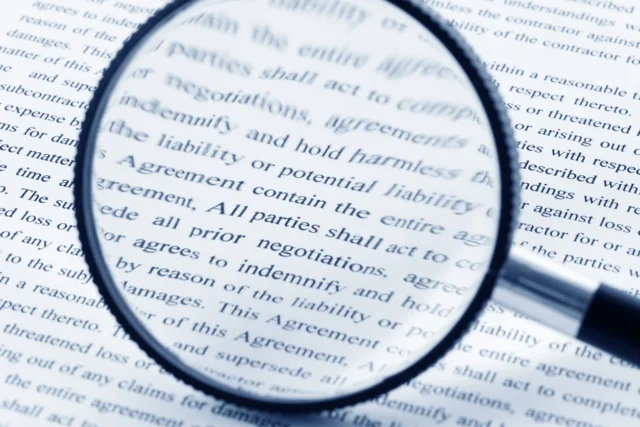
Before discussing the best practices and pitfalls to avoid, we must first understand an IP service agreement. In layman’s terms, an IP service agreement is a contract between two parties (the service provider and the service recipient) that delineates the terms and conditions of an intellectual property (IP) service.
It outlines the scope of services that the service provider offers to the recipient. Whether we’re talking about trademark and copyright licensing agreements, intellectual property security agreements, or confidentiality agreements, they all need to be drafted, negotiated, and reviewed by an experienced IP law firm.
Here is what the IP service agreement covers:
- The type of IP services that the service provider offers to the recipient, for example, assisting in trademark clearance, helping in trademark and patent registrations, negotiating IP agreements, etc.
- Clearly defined commitments and duties of both the service provider and the recipient.
- Clearly defined controls or rules (confidentiality provisions) for guarding confidential information revealed by the service provider or the recipient while the services are being delivered.
- Liabilities and responsibilities of both service provider and recipient if the services being offered lead to any problem or harm.
- Clearly defined terms and conditions linked to the payment method & payment schedule.
- Time frame within which the services should be delivered or duration of the IP agreement.
- A clear account of conditions that can lead to the termination of the contract.
An IP service agreement is a thoughtfully created legal document that creates a favorable environment for both parties involved in the contract and serves their interests. In other words, an IP service agreement protects both the IP service provider and the recipient by holding them accountable for fulfilling their responsibilities effectively under different circumstances.
Negotiating an IP service agreement is not a piece of cake. But irrespective of the complexities involved in the process, you can get the desired results with the proper guidance and effective planning.
Best Practices to Follow While Negotiating an IP Service Agreement

1. Take Legal Advice
The first and most important practice to follow when negotiating an IP service agreement is to take legal advice. Even if you have good knowledge of the law, please make sure to do everything on your own. It’s only going to frustrate you. So consult a competent intellectual property attorney and follow their advice religiously. An experienced intellectual property lawyer helps draft, negotiate, and review the IP service agreement so that you get the maximum advantages out of it. Discuss discovering potential problems or checking the terms; an IP attorney will do a great job.
2. Determine Your Objectives
Before entering the negotiation process, ensure you clearly understand your goals and what you would like to achieve through this agreement. Determining your plans well ahead of time ensures you stay focused and make good decisions that are in the best interests of your business. Considering the budget, the timeline within which you would like the project to be completed, and your objectives will help you establish your negotiation goals.
3. Collect Relevant Information
To build a convincing case for the negotiations, you must have all the relevant data, facts, details, and documentation in place. Talk about financial statements or branding, marketing, and advertising plans; every piece of information is essential. Just like, how you prepare yourself for any other legal activity, you should also prepare yourself when negotiating an IP service agreement.
4. Have Clarity on the Terms

You must review the terms of the agreement in advance. And as we have discussed earlier, it’s better to rely on a legal expert for this exercise. It would help if you did all the things mentioned above, including reviewing the terms of the agreement well before starting the negotiations.
It would help if you gained the necessary clarity on the following:
- Services to be offered by the service provider
- Payment terms
- Intellectual property ownership and licensing, etc.
5. Be Prepared to Accept Alternative Proposals
You need to be flexible while negotiating an IP service agreement. Both parties must be ready to compromise on a few things and accept alternative proposals. Taking the fact that not everything will always happen the way you want it to helps a lot. When you enter the negotiation table flexibly, it results in an agreement that offers mutual benefits.
Here Are the Pitfalls that You Must Avoid
1. Entering Negotiations Without Much Knowledge
Remember not to be in a hurry when negotiating an IP service agreement. Only enter the process after collecting the necessary details concerning the IP agreement. Do the research that’s needed. If you speed up the process without being equipped with the required information, you might face problems.
2. Not Negotiating Key Terms
Whether intellectual property ownership or licensing and dispute resolution, negotiating key terms is vital; ignoring this step can lead to numerous problems or disputes later. However, you can avoid costly conflicts by addressing critical terms promptly.
3. Overlooking Clauses

Overlooking clauses can lead to unnecessary problems once you enter an agreement. So have an expert review all the critical aspects of the IP service agreement. If you rely on a legal expert, they will avoid mistakes that leave room for future disputes. They will review the fine print as well.
4. Not Paying Attention to the Scope of Services
Your failure to pay the required attention to the scope of services can again lead to several issues relating to your expectations and the kind of services you get. To align your expectations with actuality, you must carefully check out the scope of services.
5. Ignoring the Importance of a Backup Plan
No matter what you are doing, it’s always better to have a backup plan. It gives you an alternative when your current plan fails. And the same theory applies when negotiating an IP service agreement. If you fail to enter into an agreement on your terms and conditions, having a backup plan allows you to walk away happy.
Conclusion
If you follow the best practices mentioned above, you most likely won’t face any problems negotiating an IP service agreement. However, it’s always a good idea to seek professional legal advice to ensure your agreement is legally binding and covers all necessary aspects. Consider reaching out to Shift Law for expert guidance on IP law and negotiation. With their help, you can ensure a smooth and successful agreement that protects your intellectual property and sets you up for future success.









